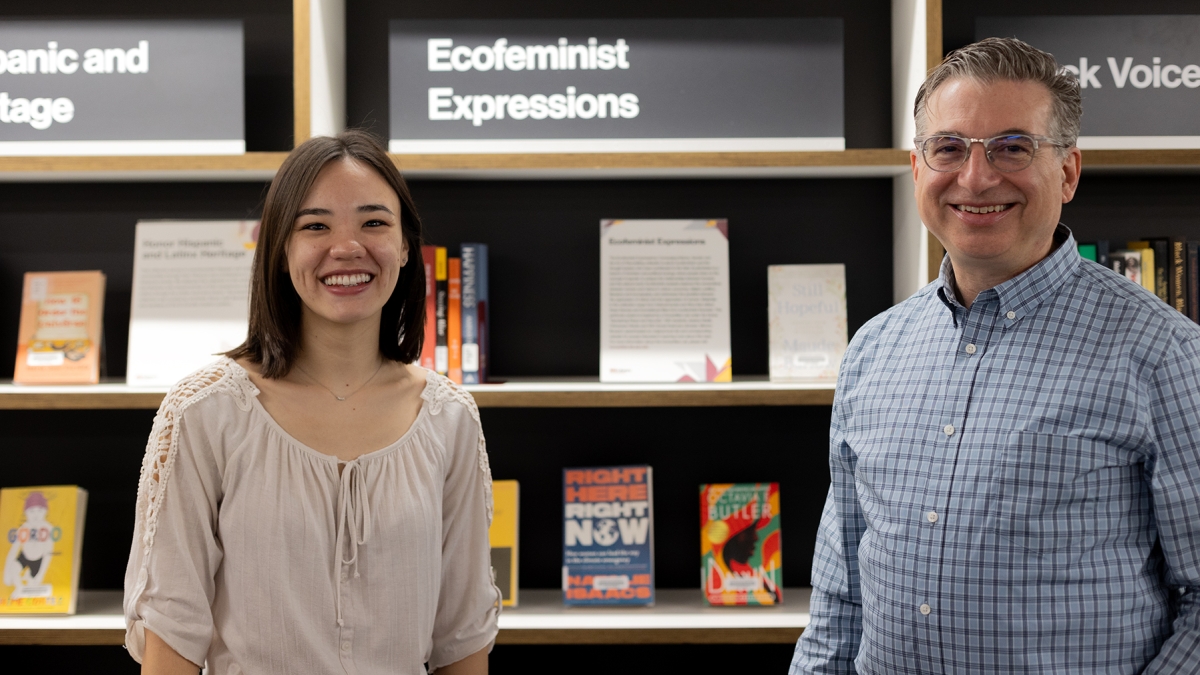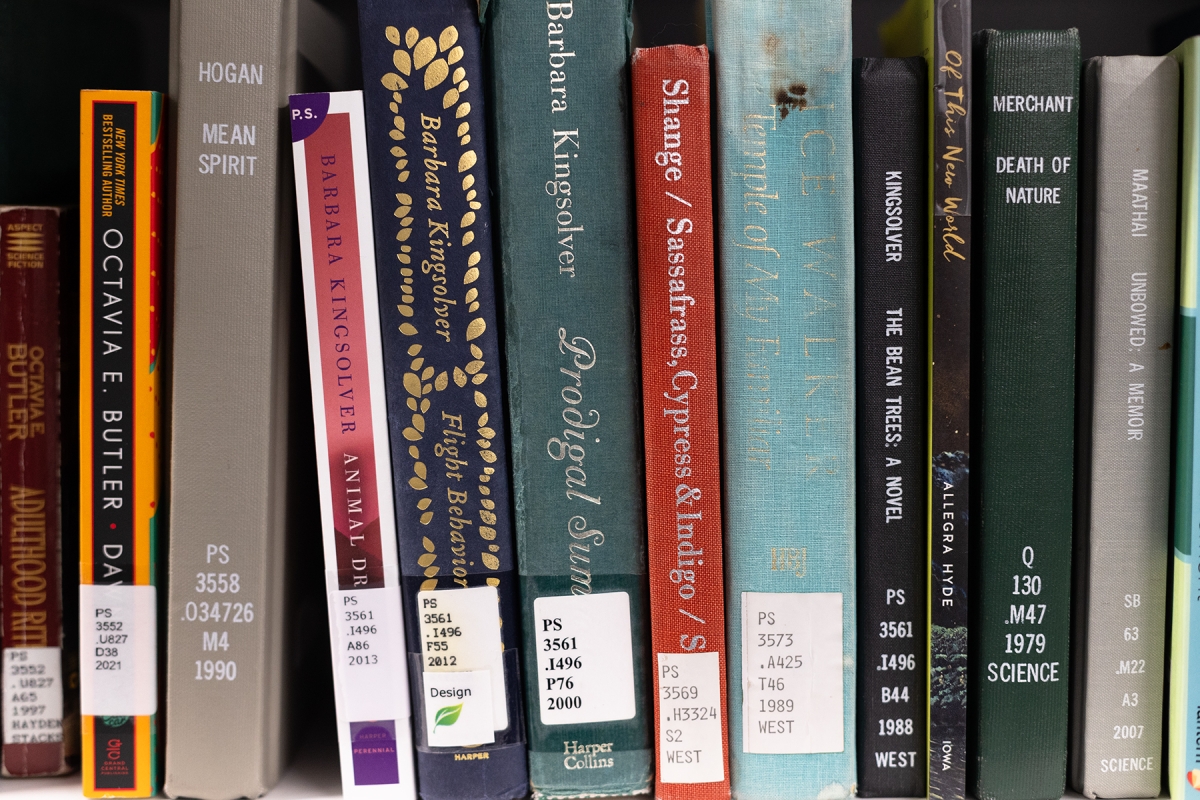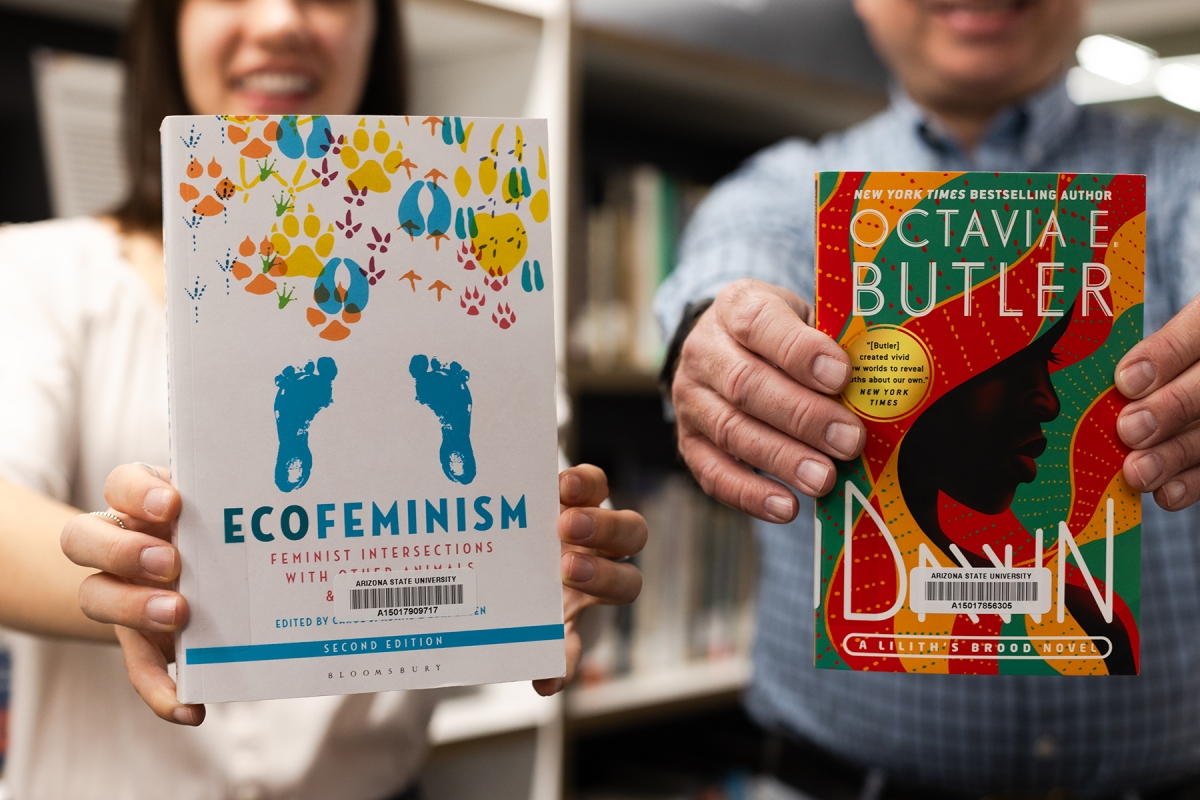Humanities Lab transforms in-class research into real-world impact

(From left) Student Jessica Hladik and ASU Associate Liaison Librarian Mimmo Bonanni in front of the "Ecofeminist Expressions" featured collection on the second floor of Hayden Library. The collection was inspired by the Gendering Peace and Security Humanities Lab. Photo by Jordyn Kush/ASU Library
As fall 2024 humanities labs launch in the new semester, the Arizona State University Library and Humanities Lab commemorate an eight-year partnership in addition to the latest outcome of their collaboration: the unveiling of a new student and librarian-driven featured book collection, titled "Ecofeminist Expressions."
The Humanities Lab’s unique format offers collaborative and transdisciplinary learning experiences for students and faculty by tackling pressing social challenges through a framework that leads with the humanities.
The embedded librarian partnership, which launched in fall 2017, pairs Humanities Lab courses and their corresponding social challenges (i.e., deconstructing race; sustainable fashion; Indigenous food systems) with expert librarians from specialized areas such as humanities, social sciences and Indigenous knowledge.
“Librarians have special skills in information and material collection, storage and retrieval, which is a major asset for students who’ve never had to work with specialized databases,” said Humanities Lab Program Manager and Humanizing Digital Culture co-faculty Monica Boyd. “An embedded lab librarian also means that the librarian is engaged with the course material alongside the student. Librarians have worked closely with student teams to create outcomes ... and enriched their lab’s inquiry through their own interests.”
With librarians in each lab course, the collaboration ignites students' ability to turn research inquiries into public-facing and actionable outcomes, including the new “Ecofeminist Expressions” collection, curated for the ASU community.
These transdisciplinary teams enrich the labs and student experiences, connecting students with the abundant resources available in the library.
“This partnership has allowed both entities to collaborate around a shared vision of creating a space for the deeper exploration of the challenging topics offered by the Humanities Labs,” said Debra Riley-Huff, associate university librarian for Engagement and Learning Services at the ASU Library. “Having librarians embedded in the labs means the students get to experience the relevance of both information literacy and the required levels of research and understanding needed to be information literate. The embedded librarians can bring tools and research methodology closer to students who may need to be made aware of them.”
This has been a welcome opportunity for librarians to work closely with faculty and students throughout the entire course.
“What's most fulfilling for me is being able to work with the two Humanities Lab faculty members, as a team and collaboratively, creating a course that engages students' curiosity and intellectual research and creativity,” said Mimmo Bonanni, a social sciences librarian at ASU. Bonanni has participated in four different labs, including "Deconstructing Race" and "Gendering Peace and Security," the first in a series of UNESCO BRIDGES Humanities Labs.
For students like Jessica Hladik, an academic senior majoring in business (sustainability) and supply chain management (with minors in Spanish and economics), having Bonanni in her Gendering Peace and Security Lab made all the difference.
“Mimmo was an incredibly supportive figure whose passion for learning and storytelling was clear to myself and my peers in the lab,” which includes her lab and "Ecofeminist Expressions" partner, Chimerezie Okezie, an informatics major in the Ira A. Fulton Schools of Engineering. “Not only did he help us with our research, but he taught us how to better navigate the resources available to us through the ASU Library system so that we could become better researchers on our own,” Hladik said.
Humanities Labs are open to all ASU students regardless of their major. The labs are the only program of its kind in the U.S.
Miki Caul Kittilson, professor and vice dean in the College of Global Futures, was the co-lead for the Gendering Peace and Security Lab. “In this lab, students connected the goals of peace, gender equity and sustainable futures for all through a transdisciplinary and comparative focus. Despite the fundamentally interconnected challenges of climate, security and gender equality, advocates and policymakers often treat each problem in isolation,” Kittilson said.
This particular lab worked with the UNESCO and Sustainable Development Goals (SDGs), and brought together a team to help answer a global call to action to improve human lives and protect the environment.
“The SDGs are built on decades of work,” Kittilson said. “Students in our lab explored the conditions that created the possibility of the SDGs, and through question-based learning, worked together to re-imagine them.”
Fall 2024 Humanities Lab offerings
Interested in learning more about future labs?
For the lab's final project, Hladik and Okezie worked on an "ecofeminism in media" book list with the idea of sharing the list throughout the ASU and Tempe communities and libraries. Bonanni was impressed with the bibliography and connected with the ASU Library’s Open Stack Collections team to collaborate to turn the original list into a featured collection. The result is the “Ecofeminist Expressions'' book and film collection that is currently located on the second floor of Hayden Library.
Kittilson emphasized how the project skillfully connects issues with sustainability. “Jessica and Chimereze’s project draws on literature to raise fundamental questions central to the analysis and re-imagining: What is gender? What do we mean by gender equality? What is peace? How do we define conflict? What do we mean by environment? How are these things connected?” Kittilson said.
“Ecofeminist Expressions” includes thought leaders who have contributed to the field, a branch of feminism and political ecology wherein people draw on the concept of gender to analyze the relations between humans and the natural world. Materials in the collection include fictional books, films and foundational titles from ecofeminist theorists.
Kittilson said, “Jessica and Mimmo’s book display is important because it provides an opportunity for students to explore these important and urgent questions through literature. Data and research are always important, and yet this connection through literature and art is vital to connecting us as human beings to these complex and urgent challenges of planetary health and peace.”
For Hladik, she hopes the featured collection can serve as a resource for students and visitors interested in learning more about the intersectionality of gender equality, women’s rights and environmental challenges.
“The original project sought to address the disconnect that may exist between how individuals understand the bond between social and environmental sides of sustainability,” Hladik said. "Although sustainability is built on environmental and social themes, there may be a lack of understanding of how they are intertwined.
“I believe creating a space where these stories are more accessible for members of the ASU community gives power to the ecofeminist movement and promotes learning for anyone who happens to come across it.”
This story was co-written by Marilyn Murphy and Maureen Kobierowski.
More Arts, humanities and education

ASU professor's project helps students learn complex topics
One of Arizona State University’s top professors is using her signature research project to improve how college students learn science, technology, engineering, math and medicine.Micki Chi, who is a…

Award-winning playwright shares her scriptwriting process with ASU students
Actions speak louder than words. That’s why award-winning playwright Y York is workshopping her latest play, "Becoming Awesome," with actors at Arizona State University this week. “I want…

Exceeding great expectations in downtown Mesa
Anyone visiting downtown Mesa over the past couple of years has a lot to rave about: The bevy of restaurants, unique local shops, entertainment venues and inviting spaces that beg for attention from…



